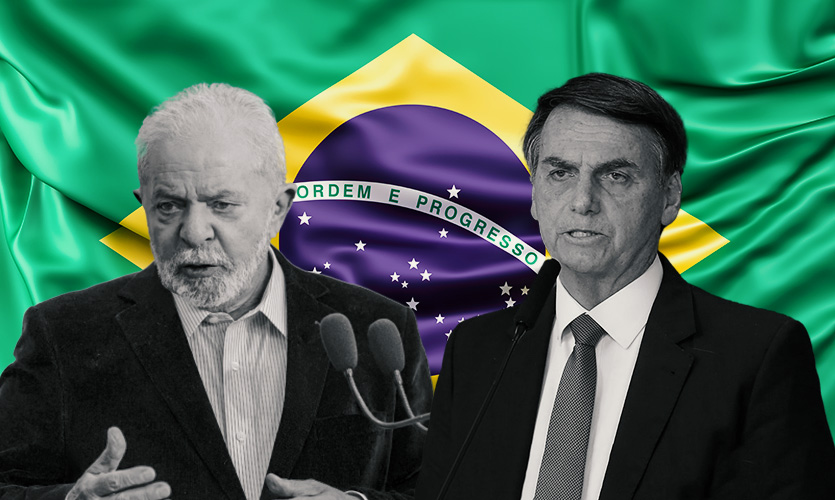The top two contenders for the Brazil president’s post will face each other again in the runoff round, after neither of them secured an outright victory in the election. The election will determine whether the far-right incumbent President Jair Bolsonaro is retained as head of the fourth-largest democracy in the world or, leftist leader Luiz Incio Lula da Silva gets reelected.
Former president Lula won 48.3 percent of the ballots, while President Jair Bolsonaro received 43.3 percent, after 99.6 per cent of the votes were counted. There were nine other candidates, but they received far less support in comparison to Bolsonaro and Lula. The leftist da Silva entered the race with a sizable advantage, as anticipated by most pre-election surveys. In the most recent Datafolha poll, which was released on Saturday, da Silva had a 50 percent to 36 percent edge. A total of 12,800 respondents were reportedly questioned, with 3 percentage points margin of error.
Professor Nara Pavo of the Federal University of Pernambuco told the BBC that this tight difference between Lula and Bolsonaro was not predicted. As he described the scheduled October 30 run-off vote against Bolsonaro at a post-vote press conference, da Silva compared it to extra time during a soccer match.
Da Silva, a former metalworker who attained the presidency after rising from poverty, is credited with establishing a comprehensive social welfare programme during his administration from 2003 to 2010, which assisted in bringing tens of millions of people into the middle class. However, he is also recalled for his administration’s participation in significant corruption scandals that involved both politicians and corporate leaders.
Da Silva was disqualified from the 2018 presidential election against Bolsonaro after being found guilty of corruption and money laundering, and sentenced to 19 months in jail. On the grounds that the judge was prejudiced and had worked with the prosecution, the Supreme Court eventually overturned his conviction.
The slogan of da Silva’s team is “the fight continues until the final victory”, and seems to thrive on conquering challenges. Speaking after casting his ballot in Sao Bernardo do Campo, the state’s industrial centre and the location of his former union leadership, da Silva recalled being imprisoned and unable to cast his ballot four years prior.
Rafael Cortez, a political risk specialist at Tendencias Consultoria, claims that Bolsonaro outperformed expectations in the southeast area of Brazil, which is made up of Sao Paulo, Rio de Janeiro, and Minas Gerais. Polls, according to Cortez, did not show this rise. The election, according to Carlos Melo, a political science professor at Insper University in Sao Paulo, proved Bolsonaro’s victory in 2018 wasn’t an accident.
In his time as president, Bolsonaro has delivered explosive speeches, put democratic institutions to the test, managed the COVID-19 outbreak ineffectively, and has deforested the Amazon rainforest at a rate that hasn’t been seen in 15 years. 33 million Brazilians are still going hungry despite increasing welfare payouts as a result of the country’s delayed economic recovery.
Brazil is thinking about moving to the left due to high inflation and a big unemployment rate. Climate activists have cautioned that the region may approach a tipping point if Bolsonaro is re-elected. Da Silva was in-charge in Brazil from 2003 to 2010, and his environmental record during that period was far from faultless, according to critics. But because Bolsonaro depends on the agricultural industry and agribusiness for votes and support, da Silva is the candidate that climate activists favour. He has gained a loyal following by upholding conservative principles, criticising political correctness, and positioning himself as the defender of individual liberty and financial stability in the face of leftist policies. The activists have, however, urged the future president to focus on topics like education and the extreme inequality in Brazil.
Given that he said that “only God” could remove him from power, Bolsonaro could not concede defeat. He cast doubt on the accuracy of the polls, as well as the accuracy of Brazil’s computerised voting equipment. Analysts claim that he could have set the stage for rejecting the outcomes. Bolsonaro was given a deadline by the election body, but he never offered any proof of wrongdoing.
Before enlisting in the army, Bolsonaro was raised in a lower middle-class home. After being discharged from the military for openly advocating for higher military pay, he entered politics. He frequently professed nostalgia for the nation’s two-decade military dictatorship during his seven stints as a fringe politician in the lower chamber of Congress. His outreach to the military has sparked worries that senior officers may support his potential rejection of the election results. Bolsonaro has urged Brazilians to support him in social media messages from right-leaning international figures on Saturday, including former US president Donald Trump.
The incumbent president told reporters after the first round of voting on Sunday morning that free and fair elections must be honoured. He offered a thumbs up when asked if he would respect the outcome and then turned to leave. President Bolsonaro referred to the corruption accusations that led to da Silva’s 580-day prison sentence before the conviction was overturned, and branded him a thief during the last TV discussion before the voting.
On the other hand, Bolsonaro has been referred to as insane by di Silva. It is hardly unexpected that this tension has permeated the streets. In Rio, neighbours could be heard yelling “Out with Bolsonaro” and “Lula is a thief” at one another in the days leading up to the election. Since the two candidates are such polar opposites, much is at stake.
While Bolsonaro has suggested that some areas of the rainforest should be made available for commercial use, Lula has pledged to strengthen protection measures for the Amazon rainforest.
Read more: Pak’s Finance Minister Quits Amid Rising Economic Crisis










